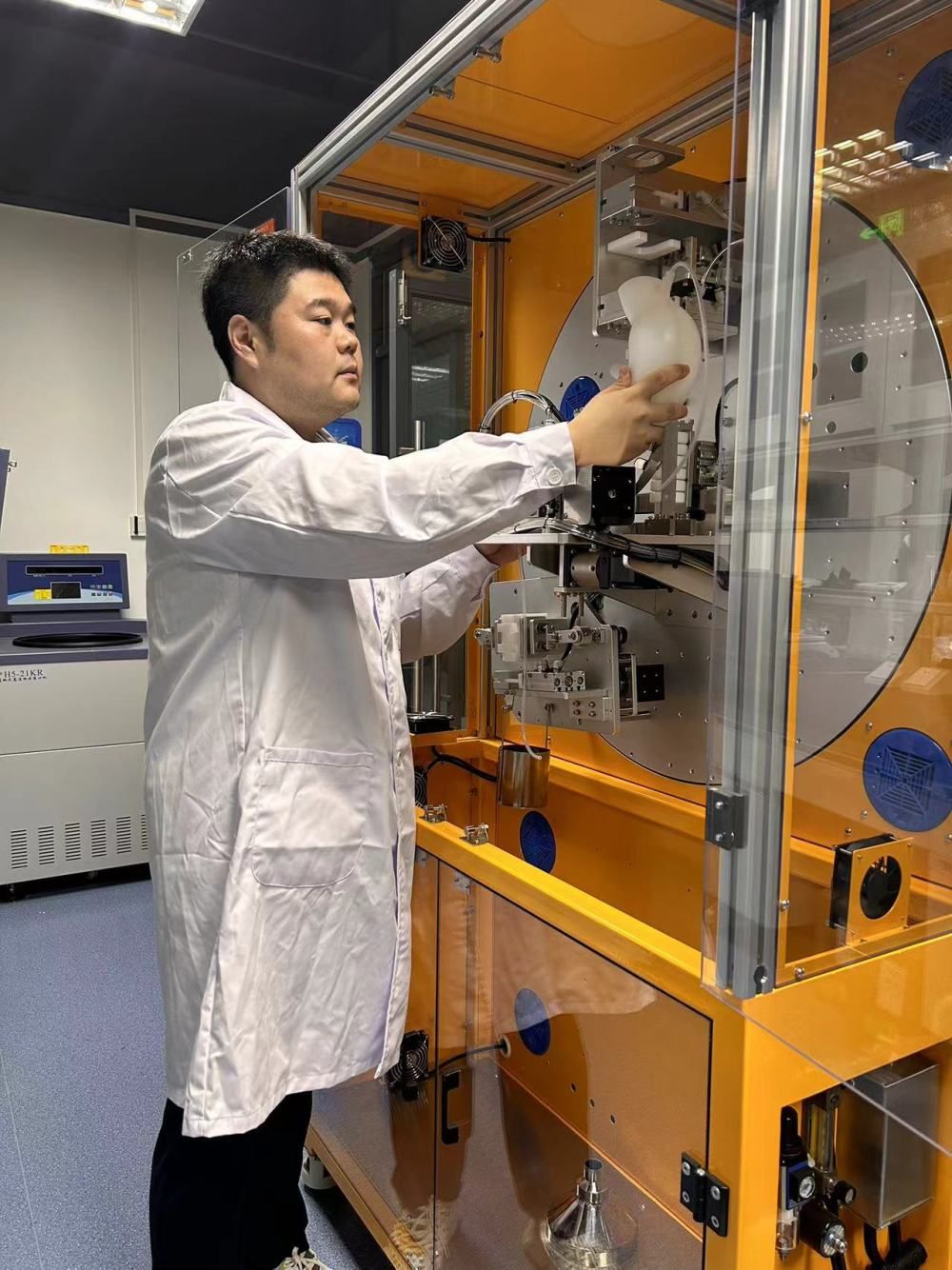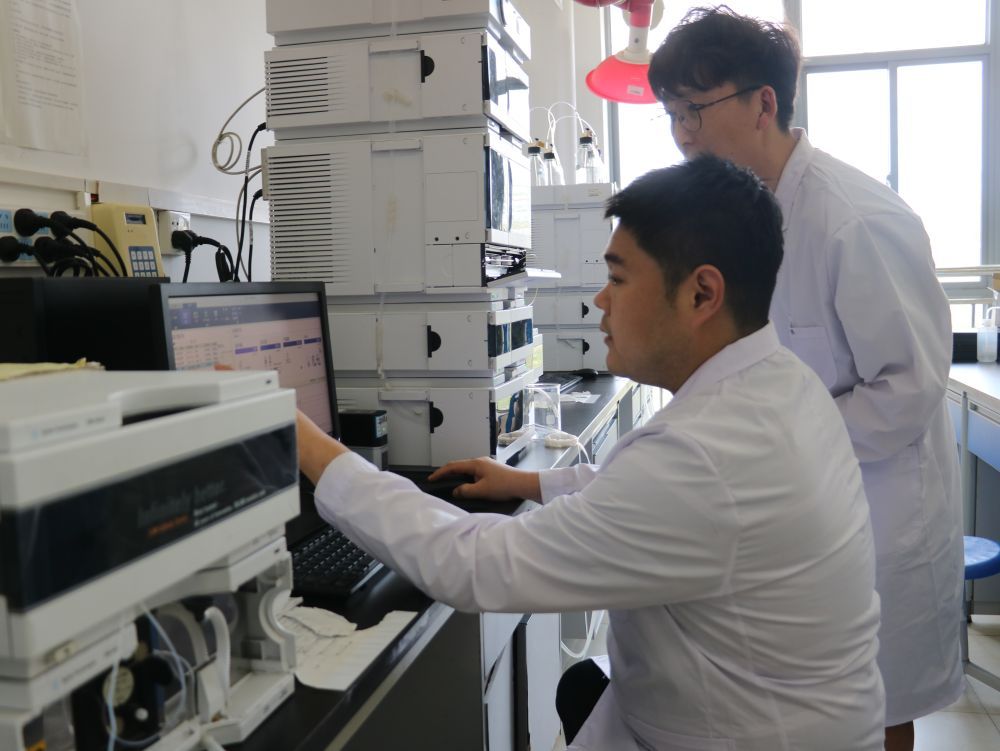After the rain, under the eaves of village houses, Professor Zhang Jiachao, from the School of Food Science and Engineering of Hainan University, unscrewed a bottle of freshly made Zaopo Vinegar (a traditional vinegar made from fermented rice wine residues), and the refreshing aroma of lactic acid wafted through the air. In June 2024, having just received the second prize of the National Science and Technology Progress Award, he lost no time in leading his team members into Puqian Town, Wenchang, Hainan, simply because it holds the key to unlocking the tropical healthy food industry. This July, Zhang Jiachao was recognized as an Advanced Individual for Dedication and Responsibility in Hainan Province.
Venturing into the Countryside to Seek the Natural“Treasure Trove of Microbes”in Earthen Jars
In 2015, after obtaining his doctorate, Zhang Jiachao joined Hainan University and chose Hainan as the starting point for his scientific research career, taking the lead in establishing a research team focused on tropical probiotics.

Hainan Island, blessed with a unique natural environment, serves as a“treasure trove”for nurturing tropical probiotic germplasm. Here, Zhang Jiachao recognized the vast application prospects of tropical probiotics.

To thoroughly explore the indigenous microbial resources of Hainan and isolate and screen probiotic strains that are better suited to the intestinal characteristics of Chinese people and possess well-defined health benefits, Zhang Jiachao directed his attention towards traditional fermented foods in Hainan, such as Fish Tea (fermented fish, chili peppers with rice), Shrimp Paste (fermented condiment made from tiny shrimp and salt) and Zaopo Vinegar.
Equipped with a sampling kit, Zhang Jiachao led his students across the island’s cities and counties, and into remote Li ethnic villages. At one doorway, he smiled and greeted an elderly woman: “Granny, could you spare me some of your Fish Tea?” Like “treasure hunters”, they continued their quest to uncover and record the valuable biological resources that thrive on this rich and fertile land.
The earthen jar handed over by the villager contained exactly the natural “treasure trove of microbes” that Zhang Jiachao had been searching for. As time worked as a catalyst, pickled fish, Shanlan rice (a type of glutinous rice grown in mountainous areas), and wild chili peppers had blended into a paste, in which rare probiotic strains maintained high viability, serving as natural “living fossils” of tropical probiotics.
Once the strains had been collected, a series of problems soon followed. Given that the collection sites were located in remote rural areas, it was often impossible to transport the samples promptly, which frequently led to the change of microbial communities, affecting analysis accuracy. Zhang Jiachao and other team members repeatedly evaluated the effectiveness of dozens of protective agents before determining the optimal ratio. Meanwhile, the team established temporary workstations in major sampling regions such as Lingshui, Wuzhishan, and Baisha, equipped with low-temperature refrigerators and dry ice to ensure that samples could be rapidly preserved at low temperatures after collection, thereby maximizing viability of the strains.
Through their efforts, the team has established a relatively large-scale tropical probiotic resource seed bank in southern China, capable of transporting samples back to the laboratory from anywhere on the island within three hours.
Directional Breeding: “Customizing” Growth Plans for Probiotics
Probiotics must withstand harsh environments in the gastrointestinal tract, such as gastric acid and bile salts. Traditional breeding methods often fail to endow probiotics with sufficiently strong tolerance, resulting in the death of a large number of viable bacteria before they reach the intestines, thereby affecting colonization and functional performance. How can efficient breeding of superior functional strains be achieved? This is the question that led Zhang Jiachao to explore new breeding approaches.
The team extensively reviewed literature, held intensive discussions, and repeatedly optimized experimental plan, ultimately developing an in vivo directional breeding technology tailored for tropical probiotics. This technology initially simulates stress conditions in the intestinal tract of germ-free mice, providing “real-world training” for probiotics. Through this efficient evolution within the living intestinal environment, the team successfully enhanced the bile acid metabolic capacity of Bifidobacterium animalis by 77%. This is a breakthrough that is difficult to achieve through in vitro methods. Subsequently, they employed a human gut microbiota-based in vitro digestion system and organ-on-a-chip models, which more closely mimic the real human body environment for validation.
The probiotics, selected in this directional breeding process, not only exhibit exceptional intestinal colonization stability but also demonstrate significantly enhanced cholesterol and uric acid metabolic functions. “This opens up a new avenue for precisely regulating human metabolic health”, said Zhang Jiachao.
Small Strains Unleashing a Big Industry
Hainan boasts abundant tropical resources. How to make research achievements benefit the public and empower Hainan’s local development has been a long-term goal for Zhang Jiachao’s team.
Currently, the team has established university-enterprise cooperation with multiple local Hainan enterprises, with technology transfer revenue exceeding 5 million yuan. For instance, the probiotic or postbiotic coffee developed in collaboration with Hainan Nongken Mushan Coffee Company incorporates tropical probiotics that the team independently screened and fermentation control technology for green coffee beans, endowing traditional coffee with entirely new health attributes. Additionally, the team has joined with other enterprises and achieved interim results in multiple projects, including the research and development of probiotic mooncakes, pepper bio-fermentation technology, and standardized preparation processes for Zaopo Vinegar.
In March 2025,the“Hainan University-WONDERLAB Tropical Probiotics Joint Research Center”was officially unveiled.It will conduct in-depth
research of and market preparation for GOLDGUT-HNU082, the world's first
identified tropical probiotic strain. Through university-enterprise cooperation anduniversity-industry-research collaboration, it aims to jointly advance academic
research and industrialization in the field of tropical microbiology.
In the future, the team will focus on the field of “tropical healthy food biomanufacturing ”. Using tropical characteristic food resources as the base materials, they plan to transform these primary agricultural products into tastier, healthier, and more nutritious new-quality foods through biomanufacturing techniques. The team will conduct systematic research and development around four distinctive systems: tropical fruit and vegetable fermentation, traditional tropical foods, Lingnan food-medicine homology, and tropical probiotics, leveraging science and technology to breathe new life into traditional flavors.
“Hainan is not just about sunshine, beaches, and tropical fruits; it can also become an innovation hub and export base for healthy functional foods”, said Zhang Jiachao.
It is common to see the laboratory lights shining late at night, since working overtime has become Zhang Jiachao’s norm. “There are no‘shortcuts’in scientific research, only reverence for every variable”,he remarked. Zhang Jiachao treasures his strain preservation cabinet, believing that the rhythmic life in the microscopic world is knocking on the door of Hainan’s tropical health industry.
Translated by Lin Junjun
Proofread by Wang Kexian